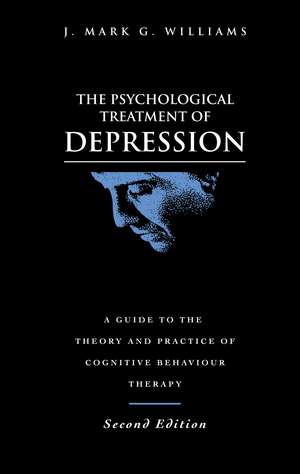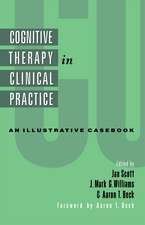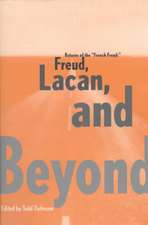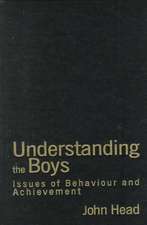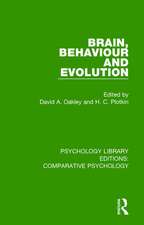The Psychological Treatment of Depression
Autor J. Mark G. Williamsen Limba Engleză Hardback – feb 2016
The use of behavioural and cognitive techniques for treating depression has yielded exciting results. Cognitive Behaviour Therapy (CBT) is as effective in the short term as anti-depressant drugs and has longer-lasting effects than medication. This book brings together assessment and treatment techniques of proven efficacy, describing them in usable detail and setting them in the context of current psychological theories of depression. It is an invaluable guide to practitioners wishing to make use of CBT.
| Toate formatele și edițiile | Preț | Express |
|---|---|---|
| Paperback (1) | 369.20 lei 6-8 săpt. | |
| Taylor & Francis – 6 aug 1992 | 369.20 lei 6-8 săpt. | |
| Hardback (1) | 975.06 lei 6-8 săpt. | |
| Taylor & Francis – feb 2016 | 975.06 lei 6-8 săpt. |
Preț: 975.06 lei
Preț vechi: 1026.38 lei
-5% Nou
Puncte Express: 1463
Preț estimativ în valută:
186.60€ • 194.10$ • 154.05£
186.60€ • 194.10$ • 154.05£
Carte tipărită la comandă
Livrare economică 14-28 aprilie
Preluare comenzi: 021 569.72.76
Specificații
ISBN-13: 9781138169753
ISBN-10: 1138169757
Pagini: 308
Dimensiuni: 156 x 234 x 19 mm
Greutate: 0.59 kg
Ediția:Revised
Editura: Taylor & Francis
Colecția Routledge
Locul publicării:Oxford, United Kingdom
ISBN-10: 1138169757
Pagini: 308
Dimensiuni: 156 x 234 x 19 mm
Greutate: 0.59 kg
Ediția:Revised
Editura: Taylor & Francis
Colecția Routledge
Locul publicării:Oxford, United Kingdom
Public țintă
Professional Practice & DevelopmentRecenzii
`Lucidly written, with case illustrations, in the words of an advertising copywriter for soaps: "Now, better than ever". Recommended. - Institute of Psychiatry Journal
`The book is clearly written throughout, well organized and easy to read. It is highly recommended for practising therapists, therapists in training and students' - British Journal of Clinical Psychology
'A clear, vigorous account of cognitive behavioural methods for treating depression' - British Journal of Psychiatry (review from first edition)
`The second edition of this book has new chapters about in-patient cognitive therapy and the process of therapeutic change. Like the first edition, it is comprehensive and clearly written. I would recommend it to anyone interested in learning about the subject.' - British Journal of Psychiatry
`This book served to remind me that there are many valid ways in which people can be helped.' - The Samaritan
`The book is clearly written throughout, well organized and easy to read. It is highly recommended for practising therapists, therapists in training and students' - British Journal of Clinical Psychology
'A clear, vigorous account of cognitive behavioural methods for treating depression' - British Journal of Psychiatry (review from first edition)
`The second edition of this book has new chapters about in-patient cognitive therapy and the process of therapeutic change. Like the first edition, it is comprehensive and clearly written. I would recommend it to anyone interested in learning about the subject.' - British Journal of Psychiatry
`This book served to remind me that there are many valid ways in which people can be helped.' - The Samaritan
Cuprins
1 Introduction 2 Psychological models of depression I: The behavioural background 3 Psychological models of depression II: The cognitive foreground 4 Psychological treatment of depression: Outcome studies 5 The assessment of depression: Some representative procedures 6 Treatment techniques I: Overview, basic behavioural techniques and symptom management 7 Treatment techniques II: Cognitive strategies 8 Treatment techniques III: Behavioural and cognitive therapy for chronic and unremitting depression 9 Training exercises 10 The cognitive theory of depression revisited 11 Cognitive-behavioural therapy and the process of change
Descriere
A practical guide to the wide range of cognitive behavioural therapy techniques used in the assessment and treatment of depression, describing them in usable detail and setting them in the context of current theories of depression.
